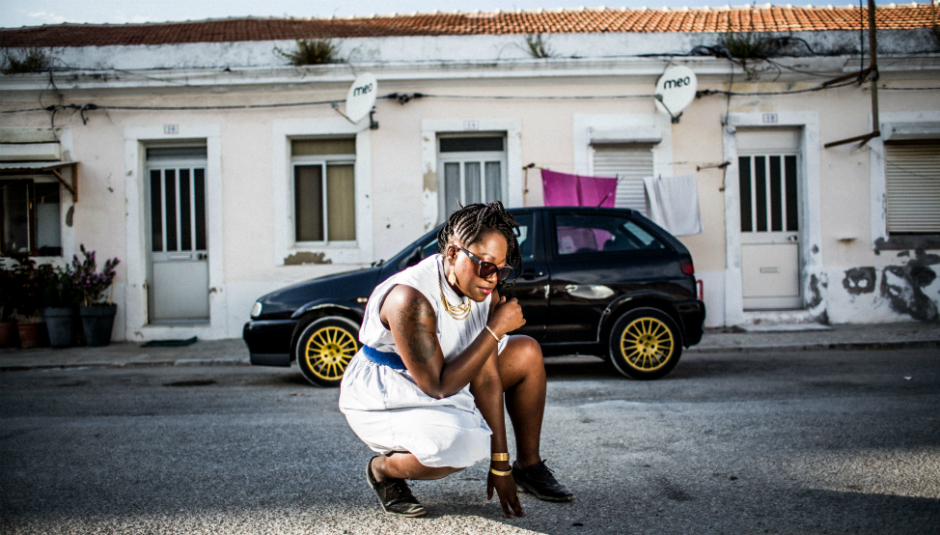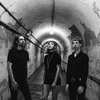Mélissa Laveaux is wired. As wired as you expect someone who retraced her own lineage to be. The Ottawa-born, Paris-based Laveaux’s recent album Radyo Siwèl reclaims her Haitian roots with a collection of native folk spirituals, refurbished and filtered into her own musical tenets. The number of influences imbued – psych rock, calypso, folk – would be considered dazzling if they didn’t manifest themselves in such deft, understated fashion. This is a record brimming with defiance, cheekiness, and pride.
While the music she performs has a tendency to both soothe and sweep, everything else around Mélissa Laveaux seems to be in constant motion. When we link up over Skype, Laveaux can hardly finish a thought before moving on to the next. “My mind is running in circles at the moment, so I apologize in advance.” A train of thought strangely symbolic to one of the musician’s many current projects, And Sometimes The Flower Is Just The Knife, a concept play about a Haitian spirit who travels across history by possessing bodies of her descendants.
The making of Radyo Siwèl involved a similar quest of connecting the dots of the past. For a long time, Haitian culture – and the Creole language in particular – were like a “sorority we didn’t have access to”, as she told The Guardian. Pivotal for her extensive historical nosedive was the work artist and activist Martha Jean-Claude, whose music outlined the US occupation of Haiti, even as she remained in exile.
Radyo Siwél paints with words as much as it does with sounds: it yearns for reconnecting with the lost, like a transmission, the moment Laveaux started replacing the static – the gaps – with new historical, cultural and lingual knowledge. On Radyo Siwèl, she found awareness of her own place in the present day and the importance of mapping out her own testimonial. This came in the form of an original composition ‘Jolibwa’, about the people protesting the imprisonment of Joseph Jolibois, who sadly died while incarcerated in 1936.
But Laveaux, in true Haitian fashion, chose to emphasize uprise over defeat. Or, as Bekki Bemrose pointed out in the DiS review: “The story’s gravitas is never compromised by the liveliness of the delivery. If anything, choosing to relay these often dark tales with such upbeat vibrancy merely adds to their profundity.”
We catch Laveaux on the cusp of a new residency, but with her mind in a lot of places at once. Which also meant a great breadth of wonderful insights.
DiS: The residency that you’re about to embark on, what does it entail exactly?
Mélissa Laveaux: It’s a residency related to the performance/play that we’re preparing. It’s not a musical, it’s more like a drama – a theatrical concert where my whole band play different characters. And me too: I play a killer mermaid that’s also a muse. In exchange, we were asked to do a lot of social actions in the community. I’m holding a workshop, focused on how I write songs, and how I’m transitioning those songs into this performance.
You are talking about the performance And Sometimes The Flower Is Just Another Knife right?
Yes.
From what I’ve read, it’s about a spirit that moves from one person to the next through time. It reminds me of the depiction of Azazel in that Denzel Washington movie, Fallen. Does it overlap to Radyo Siwèl in some shape or form?
The performance does bleed into Radyo Siwèl a little bit because on the album there’s a song called ‘Lasirèn Labalèn’, which is basically a folk song. A playground kid’s song. In the song, there’s a lyric which translates to "My hat falls to the sea". When your hat falls to the sea, the mermaid - or her sister, the whale - is taking you as her lover. You have to obey her, and the whole performance is about how this – first of all, she’s a young girl when Ghana is still called the Cape Coast. When she realizes she was about to step on a boat to be sold to slavery, the waters told her to drown herself, so she would become an immortal spirit.
Suddenly, she holds the role of being a memory to keep those around her accountable for their history. Her first mission as this memory is recollecting everything the slaves had to remember when they travelled from West Africa to the Caribbean. And when she arrives in the Caribbean she’s in the body of Jeanne Duval, who ends up being Charles Baudelaire’s mistress – the father of French literary movement Romanticism, who translated Charles Dickens. Duval was Haitian. For a long time, this fact was denied by a lot of French historians. At the crux of the performance: how could you deny that the woman who inspired one of the most lauded pieces of writing in French history, was black? I think people need to remember this, it’s really important to see she was present at that time. The whole play is a metaphor for the fact that she was there… the spirit is telling people to remember all these things.
It sounds so sci-fi, kind of like Octavia Butler’s novel Kindred.
That’s exactly who it’s inspired by. Except with a lot less emphasis on science. Octavia is very precise; when she would write her novels, they would all be very much grounded within the confines of science.
So the play puts more a spiritual angle on time travel?
Yeah, it touches more on the spiritual element of the science, in terms of the play being inspired by Haitian and West-African folklore.
We associate folklore a lot with history, whereas now we have popular culture, which has replaced a lot of our mythology. But myth still stands at the root of a lot of it. Tina Turner’s ‘Proud Mary’ channeled Egyptian lore, Aaliyah did the same thing later on. So it makes me wonder, as a purveyor of pop music, what’s your own relationship to myth?
Oh, it’s super inspiring to what I do! I remember on my first album, I wrote a song called ‘Ulysses’, on my demo’s I had a song called ‘Phoebus’. I constantly find myself loving various mythologies, because they’re these totem stories which are there to teach us how people think, how people solve problems. They always have a cautionary tale to them. It’s fascinating, because mythologies inspire a lot of folk tales for children. But they’re a lot gorier. I mean, The Tale of the Minotaur is just super gory. The tale of The Medusa, also very gory. So is The Tale of Jason and the Golden Fleece. Even the mermaids in Ulysses and The Sirens. I’m a big fan of sci-fi, but I’m especially a big fan of horror films. And I like it when those two worlds collide. And then, if you add that element of folklore...the reason why I watched so many horror films, is because my parents wouldn’t make us afraid of horror. However, they would make us afraid of possession.
The type of horror movies I’m afraid of are always Poltergeist or The Exorcist. Those movies always seemed very real for me. As opposed to Alien: like sure, whatever. I’ve been very inspired by horror and gore… and a beautiful love story about a very gory topic. I think that’s also very Haitian. I have commented that Radyo Siwèl’s music sounds so happy, whereas the songs themselves can be really dark. But I think part of Haitian culture is to celebrate this strange mix of very dramatic and very bad things happening and yet you can still dance to them, you can still have a beautiful melody. This kind of beauty mixed in with getting over something bad that happened, becoming resilient. So yeah, there’s always this mixture of dread and beauty in Haiti, and I wanted to reflect that on the album.
You make an interesting point there though. Usually when you hear about Haiti on the news, it’s about something gruesome: the Oxfam scandal, the natural disasters, and the abject toll they take on the population. To bring an equilibrium in that, also highlighting the people’s coping mechanisms and sense of humor, shouldn’t be understated.
Every country has their own coping mechanisms, the difference is we don’t hear about Haiti’s – when we hear about a country that’s foreign to your own, there’s an archetype of what you can write about it as a guideline. And you don’t get to illustrate the full picture. Hopefully, this album gives sort of a more complete picture of what Haiti can be as well. Even though I was not born there, a lot of the culture has been passed on to me. I thought it was important. Journalists, especially in francophone Europe, are often experts in certain types of music, and they’re like: "I know this artist, this artist and this artist...why not perform it like they do?" And I’m like: that already came out and it’s already good, why would I copy that, only not as good?
On the album, you’ve illustrated your displacement from Haitian culture by using the imagery of radio and static, the music still being an incomplete transmission. But a record becomes a conversation once you put it out. Has some of that static been replaced by new knowledge of yourself and the stories you convey?
One thing that’s been really funny is remembering things I couldn’t remember before. Things stored in the back of my subconsciousness. Doing these interviews after the record’s been out and I’m like: "Oh yeah, my dad bought me a guitar like a week after we came back from Haiti." Some stuff came back to me that was really important for my foundation as an artist. Getting a guitar is like a really big event in my life, but I couldn’t precisely remember that moment. Those things tend to pop up during interviews. Sometimes things make sense in my head before I understand the full gist of it, I had a good instinct that this is going to work out.
The quality of feedback and the interviews we’ve gotten have been so good, the conversations have been really interesting. But when I read some of them back I was like, “I don’t sound like this!” It’s very sensationalist like “Yeah! My paternal grandmother couldn’t read!”. I’m sort of sad about that aspect of it. But that was the only one; as the ball starts to roll on this album, it’s going to focus more on what other people have to say. For me it’s really important that I’m not misconstrued, I’m probably like, don’t quote me out of context, it’s important that the complete picture is explained as opposed to just a little bit. I’m offering a bit, but I’m also offering a rather complete image.
The album deals with different topics: not just (sexual) violence, but also the positive side of sexuality, having agency over your own sexuality. There are a lot of erotic songs on the album as well. And people ask why would you want to release that in a time where sexual violence is very rampant? I think it’s very important to show that as a foil. Sexual violence is different than sex. That’s why people will ask: "Oh, did you get raped during sex?" It’s either consensual or it’s not consensual. The album deals with consent, the reclaiming of the body, the reclaiming of the country. In a nutshell, there are a lot of things for me on this album I wanted to include. It’s almost overstuffed!
What songs on the record address this different idea of courtship and sexual freedom?
'Angeli-ko' is clever for me because it conceals the way the author chose to make fun of the US marines, comparing them to a useless housewife. Whereas in Haiti, a strong and knowledgeable housewife is worth gold and wields a lot of power. 'Nan Fon Bwa' refers to the fact that the Marines really tried to dissuade Haitians from practicing vaudou - because it scared the shit out of them. Frantz Casséus wrote a seemingly simple song inviting someone to come out to the woods, because there are water and flowers, drumming and yanvalou dancing, beautiful young people - all elements you need for a ceremony. No one cared about their rules and life would go about its way. 'Lè Ma Monte Chwal Mwen', I chose to put on the album knowing that Marines were scared of vaudou and also repulsed by its close relationship to a fluid sexuality. I particularly love this song because it refers to possession - “When I am riding my horse, someone is bound to yell”. No one in Christianity would equate being taken with the spirit as the same as a sexual act!
Vaudou has – particularly opposed to many other religions condemning homosexuality – always been very open to sexuality in different genders. For me, that was very interesting. Not to mention very modern. And I thought that piece of modernity needed to be expressed on the album. One of the biggest excuses during the start of American occupation of Haiti was: "Oh, Haiti isn’t a progressive thinking, modern population, they’re savages, backwards." But they were so ahead when it comes to progressive thinking on gender for example. Even in the language itself. All the songs were written in Creole, and I was going to sing them in Creole anyway. Creole is a relatively recent language, it’s sprung from the last 300 years or so. But it’s a genderless language, it only has a single pronoun.
This record has been very politicized in some publications, where in fact, it could also be viewed in an autonomous, personal context. Where do you stand in this balancing act?
Well, the militant part of the record is very important to me, but the album is also very personal. It’s me going back to Haiti, asking questions about my own identity, how much of my identity as Haitian can I dive into, and borrow from. And bring back to share with others. Radyo siwèll has me looking into Haitian history, and the type of story I wanted to tell was one where I had my own narrative. There was actually an order to the record that completely changed because I wanted the songs to each sound different, yet maintain a flow to the record. Because I already honed and played the songs on stage before recording them. The idea was: Haitian people have many ways of resisting oppression, and one of those ways was by literature and song, by culture in general. Sculptors, painters, poets.
And I wanted to pay homage to the people who are the literal voice of the country. In Haiti, journalists and writers are the most venerated people: those are very honourable professions. However, if you’re the child of an immigrant from another country, they plan for you to become a doctor. But becoming a journalist on Haiti is a really brave profession as they get smacked on the most, they get censored. It’s very hard. Freedom of Speech is a huge thing in Haiti, because Haitians have fought hard for their independence.
So for me, there had to be voices on the record. Sort of an idea of emancipation, a reclaiming of one’s space. Of one’s body. And that being a militant act in itself. There are so many ways of saying you’re overcoming something, you can overcome by refusing certain things in your own country, by organizing, by supporting activists, writers who are put in jail. I wanted an album that was both militant and pop-sounding because that’s where music comes from anyway.
One more question before I ‘ll leave you to prepare for your workshop. It’s actually related to that somewhat. To what extent are you active within your own community in Paris?
I’m associated with this local jazz festival Banlieues Bleues, who’s offered me the opportunity to give a workshop to middle schoolers in the 93 - a suburb of Paris that gets a bad reputation. This week was cancelled so I’m a little sad! I chose the subject 'marginalized punk as tool of resistance’. So they’re learning about the beginnings of punk, but not like The Stooges or anything; the first song they learned was 'Mississippi Goddam' by Nina Simone. And I taught them about Arthur Lee of Love, how he was a protopunk. A band called Death, who were initially a funk band. Death Grips, X-Ray Spex.
Unfortunately, we won’t be able to learn more than six songs, but with every class, I have a little Powerpoint presentation. It’s funny, during the first class, I try to let them identify how some music could be punk without necessarily being punk rock. It was really great to see the girls notice: "The singer isn’t trying to be pretty!" Their mind was blown. It’s interesting to have that type of syntax. It’s a lot more interesting to work with kids, because their minds are more impressionable. And planting the idea that music can be used to express discontent and rebel.
Radio Siwèl is out now via Paris label No Format. For more information about Mélissa Laveaux, including forthcoming tour dates, please visit her Facebook page.
Photo Credit: Romain Staros Staropoli






















